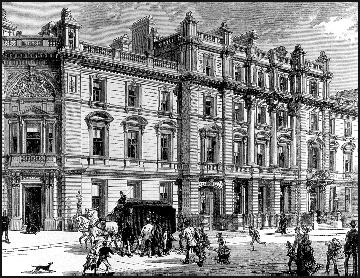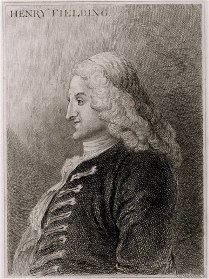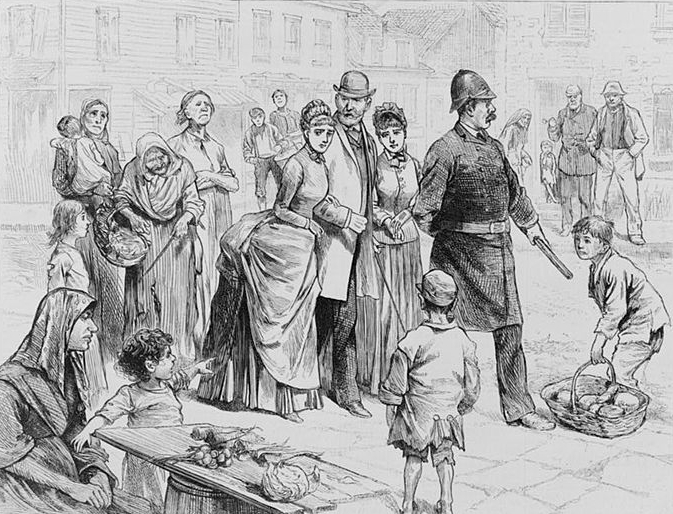Brief history of the Police and Policing in England and the United States
France is believed to have established the first police force, and she was followed by England in 1828, after the celebrated Peel Act was passed.
Police, a body organized for the maintenance of the public peace and security, and the protection of public health and morals. In the present article the word police is used in the modern sense of constabulary or policemen. A thoroughly good system of police was not possible until society had so far advanced that public opinion was consistently on the side of law and order, and opposed to violence and crime. Before the formation of the Metropolitan Police there existed in England no organized body charged with the maintenance of order and the suppression of crime.
In some of the larger towns paid paid watchmen, generally very inefficient, were appointed; and outside these towns there was nothing but the petty constable appointed for each parish or township by the jury at the court leet, or, where no such court was held, by two justices. These parish constables generally appointed deputies to act for them, were in many cases characters of the worst description, who lived by extortion and the countenancing of every species of vice.
In 1842, thirteen years after the establishment of the Metropolitan Police, an attempt was made to reform the parish constables, and provide for their appointment on a sounder bases: but the new type of organized force had in the meantime proved its efficiency, and similar forces were organized in the boroughs under the Municipal Corpora- tion Act, 1835, and afterwards in the counties. In 1872 an act was passed which provided that for the future no parish constables should be appointed unless the justices in quarter sessions should think this necessary.


The Bow Street Runners have been called London's first professional police force. The force was founded in 1749 by the author Henry Fielding and originally numbered just six. Bow Street runners was the public's nickname for these officers, "although the officers never referred to themselves as runners, considering the term to be derogatory". The Bow Street group was disbanded in 1839.
The City of Glasgow Police was the police of the City of Glasgow, Scotland. In the 17th century, Scottish cities used to hire watchmen to guard the streets at night, augmenting a force of unpaid citizen constables. On June 30, 1800, the authorities of Glasgow, successfully petitioned the British Government to pass the Glasgow Police Act establishing the City of Glasgow Police. It served Glasgow from 1800 to 1975, when it was amalgamated into Strathclyde Police.
It is sometimes described as the first modern-style municipal police force, although due to the original Glasgow force's small size and varied duties (as well as policing they also fought fires, called the hours and swept the streets, thus in many ways more closely resembling the older city watchmen this title has previously been claimed by the London Metropolitan Police. However, following formal enforce- ment action by the Advertising Standards Authority, the Metropolitan Police gave a written undertaking never to repeat this claim again.

When many early Europeans first arrived to our shores, they were surprised at the lack of organized law enforcement. It was more or less, "the stronger were policed themselves and their communities".
After "things" got fairly well settled the job of maintaining order in the new colonies was given to Justices of the Peace, and one might see "culprits" in pillories or stocks, paying their debt to society. But, as colonies changed into towns and towns into cities, the Justice of the Peace system was not enough. It became time for an organized, and for salaried policemen (there were no policewomen at the time). In the early 1600's, Boston launched Night Watch, which idea worked reasonably well as long as the area remained a rural and agrarian one. New York City established the Shout and Rattle Watch in 1651, but, by 1705 Philadelphia found it necessary to divide the city into ten patrol areas.
This was really the first stab in America at "organized law enforcement" (for what it was worth). Sometime between the Revolutionary and Civil Wars, the more than rapid growth of population and industrialization in America mandated the development of municipal police departments. In 1833, Philadelphia organized an independent, 24/7 police squad. . In 1844, NYC maintained two police forces; one unit working day, and one graveyard shift. During this period, police departments were headed by police chiefs, appointed and accountable to political bosses eerily similar to what was seen in the black and white police movies of the 1940's and 1950's. Corruption ran rampant.
Some of the law enforcement we inherited from England was "The Sheriff System". (Remember the infamous Sheriff of Nottingham from Robin Hood?) As America moved west, in most frontier towns the sheriff was the chief law enforcement official. He could be recruited from the local community, or more often a Sheriff was selected by his reputation, and the more dismal the rep, the more likely he was to be elected. The Sheriff System exists in America today, but, on a more formal and politicized basis.
21st Century law enforcement agencies and departments are highly specialized organizations, with ongoing training to prepare to meet a great variety of problems and situations. We have federal, state, county, and municipal police. We no longer live in our parent's world. There are dangers we face daily they couldn't have imagined. There is a fine line between real life and the Internet. We remain dependent on peace officers from every organization for our" life, liberty and the pursuit of happiness and to enforce the vision of our founding fathers when they penned that brilliant document, the U.S. Constitution.